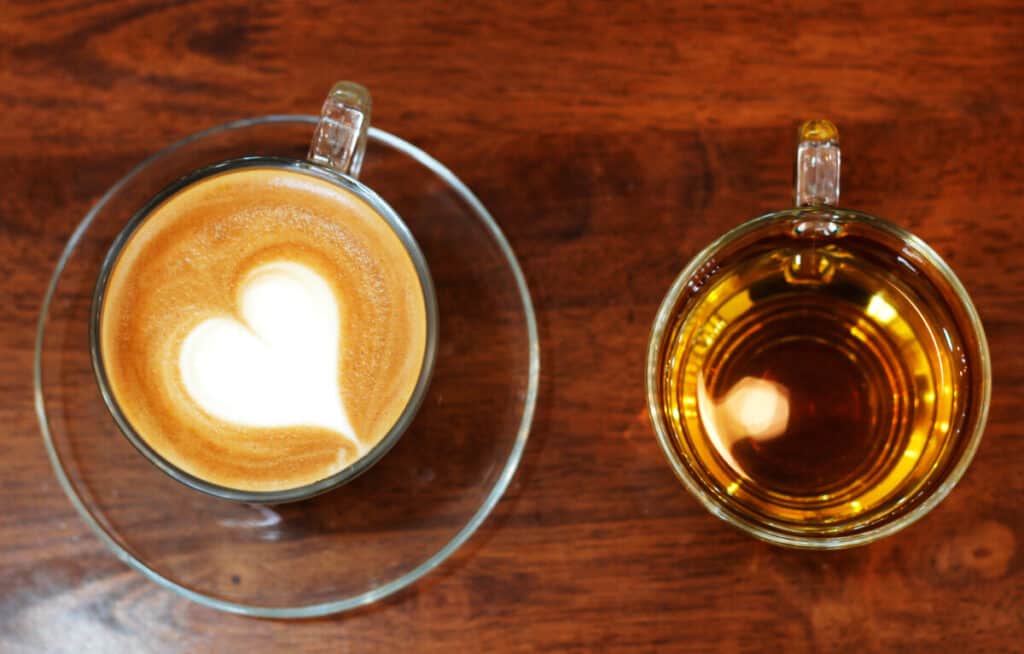
Caffeine is something that can help most individuals get through long days. There are different amounts of caffeine within different beverages, so it’s important to be aware of the amount of caffeine that is being consumed. So, can you have tea after coffee?
Tea can be drunk after coffee, however, on an empty stomach, drinking tea shortly after coffee can lead to stomach issues, so it is important to make sure to eat when drinking these beverages. It is also important to be drinking enough water to offset the large amounts of caffeine consumption.
There are many things to consider when deciding to drink tea after already having had a cup of coffee. Information needed to know about safe caffeine consumption is listed below, so keep reading to learn more!
Drinking Tea After Coffee
Moving from one caffeinated beverage to another is something that is becoming more common among caffeine drinkers. A common combination of these caffeinated beverages is going from coffee to tea. These beverages contain different amounts of caffeine, so it is important to be aware of how much caffeine is being consumed throughout the day.
Tea typically has significantly smaller amounts of caffeine than coffee does. As long as caffeine consumption is done smartly, there are not any significant side effects. Many of the side effects of caffeine consumption are very minor.
When looking at the amount of caffeine in tea leaves versus coffee beans, it would appear that there is more caffeine in tea. However, in a cup of coffee, there is 95mg of caffeine versus the 26mg-47mg of caffeine that is a cup of tea. The amount of caffeine differs in coffee and tea depending on the brew of coffee and the type of tea, but typically consuming a cup of tea after a cup of coffee means that you have consumed at least 120mg of caffeine. (Source)
The FDA recommends that healthy adults should not have more than 400mg of caffeine per day, so drinking a cup of coffee and a cup of tea is perfectly fine!
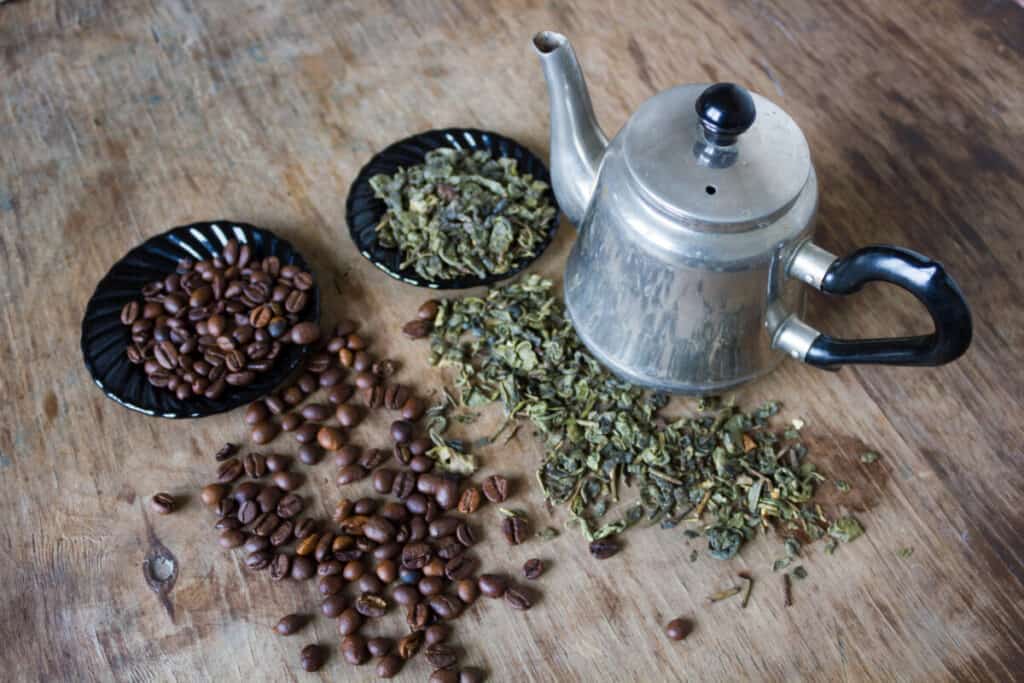
Important Things to Know when Consuming Caffeine
It is important to keep track of the amount of caffeine that is being consumed throughout the day. Having too much caffeine can lead to dehydration, headaches, and, in some situations, stomach issues.
To avoid dehydration, it is important to make sure that water is included in your beverages for the day. The amount of water that is being consumed should be enough to offset the amount of caffeine being consumed, as well as the amount of water your body needs daily to be happily hydrated. For each serving of a caffeinated beverage, it is important to have at least one glass of water. Keeping track of your water intake is something that is crucial in ensuring you are fully hydrated.
In order to avoid experiencing stomach pains after consuming caffeine, it is important to make sure you are not consuming caffeine on an empty stomach. Ergo, you should be eating while drinking caffeine. Whether you are having coffee, tea, soda, or energy drinks, make sure to have some food in your system as well.
There are a few reasons that caffeine consumption can lead to headaches: headaches can be a result of dehydration, too much caffeine, caffeine withdrawal, and drinking a lot of caffeine on an empty stomach.
General Effects of Caffeine on Your Body
Caffeine has some effects on the body, but most are very minor. Caffeine allows your body to feel more awake and aware by stimulating your central nervous system. While many think that caffeine actually wakes up your body, it is the stimulation of your central nervous system that is actually causing your body to feel more awake.
Caffeine is a diuretic, which means that it works to remove salt and water from your body. Drinking caffeine can result in an increase in urination as a result of the caffeine trying to remove excess salt and water from your body. (Source)
For some individuals, caffeine increases their amount of stomach acid which can result in stomachaches as well as heartburn.
Other common effects that caffeine can have on some people include elevated heart rate and blood pressure. Caffeine can even mess with the rate at which your body absorbs calcium.
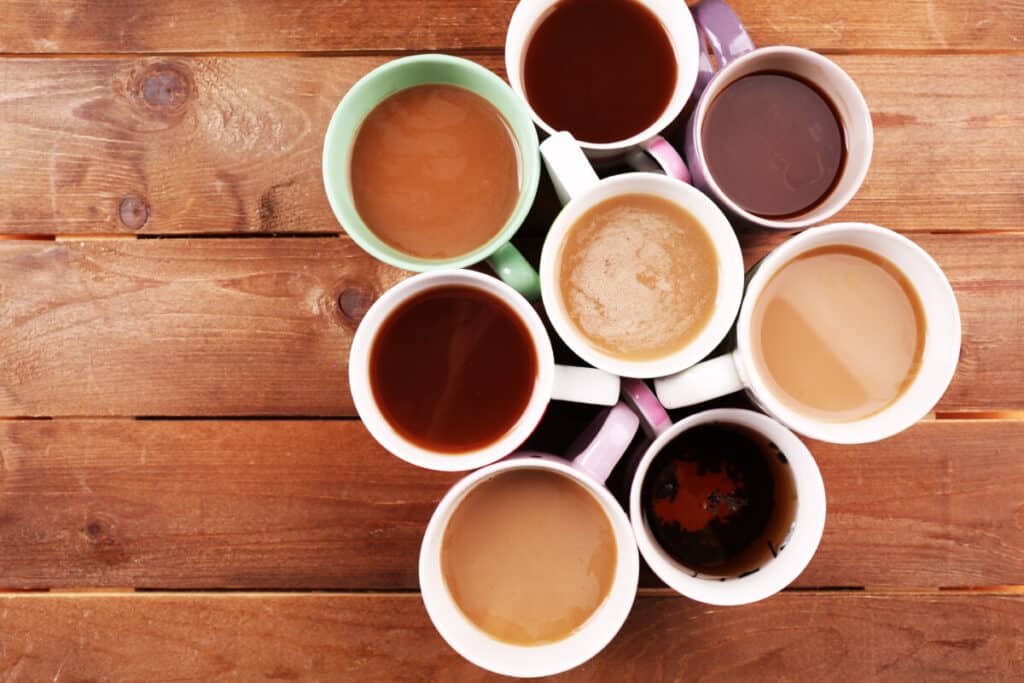
Side Effects of Too Much Caffeine Consumption
Paying attention to the amount of caffeine that is consumed is important. Having too much caffeine in a short amount of time can lead to a variety of side effects. While most of these side effects are very minor, it is important to be aware of them. Being aware of the effects of too much caffeine can help you not panic while experiencing some of these symptoms.
One side effect that can be experienced after too much caffeine is anxiety. A lot of people are somewhat familiar with the idea that caffeine can lead to someone being jittery. Being jittery, high heart right, and being shaky are all symptoms of anxiety but also can be experienced as a result of too much caffeine. Consuming too much caffeine, especially if you are not used to it, can make you feel like you are having a panic attack.
While many people consume caffeinated beverages when they’re tired, having too much caffeine can actually result in experiencing insomnia or restlessness. After experiencing restless nights, an individual’s dependency on caffeine may increase. (Source)
It is possible for an individual to develop a dependency on caffeine. While this dependency will not affect their lives as long as they are consuming caffeine, there can be symptoms of withdrawal when their body is not given the caffeine it has grown to need. These symptoms of withdrawal can include headaches, mood swings, and constant craving for caffeine.
Coffee vs. Tea in the World
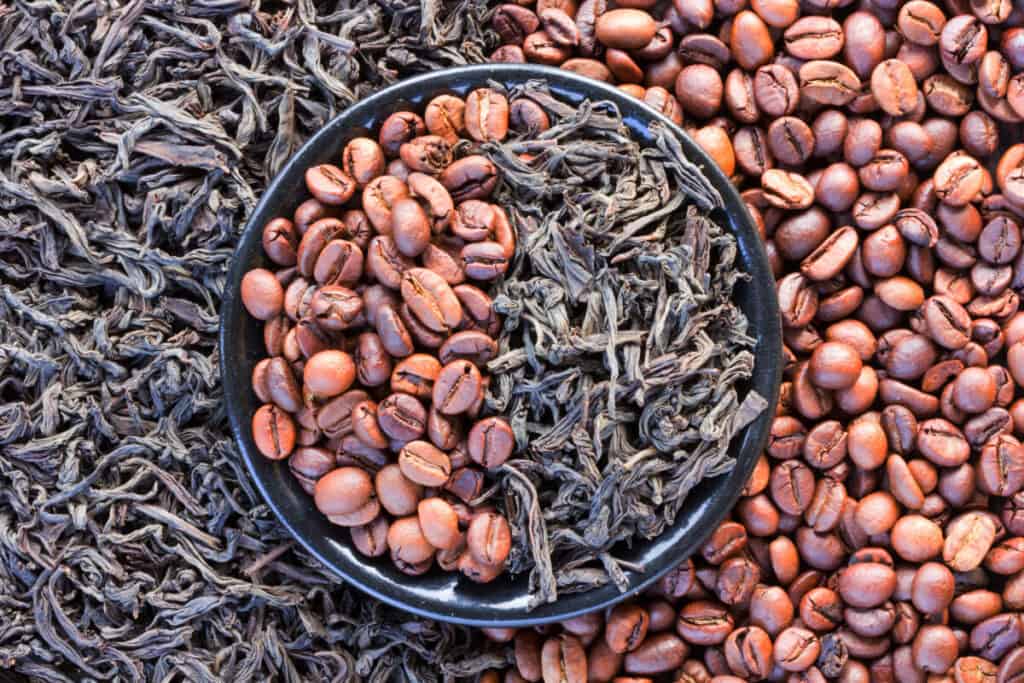
The popularity of the consumption of these beverages depends on location. Overall, more developed countries tend to prefer coffee over tea, while developing countries tend to favor tea over coffee. There was a study done in order to find the consumption patterns pertaining to coffee and tea. In this study, the results showed that 23.4% of the world’s consumption of tea was done by developed countries including North America, European countries, Japan, Australia, and New Zealand. This group of developed countries is behind 71.5% of the world’s consumption of coffee.
Places that are still developing, such as parts of Africa, Latin America, and Asia are behind 76.6% of the world’s consumption of tea. These countries are responsible for 28.5% of coffee consumption throughout the entire world. (Source)
Despite all of the coffee being produced in the underdeveloped parts of the world, their consumption of this product is significantly lower than the developed parts.
Caffeine in Different Brews of Coffee
Despite what many individuals think, it is important to know that the taste of a cup of coffee has nothing to do with the amount of caffeine it contains. When brewing coffee, the ratio of ground coffee beans to water is what determines the amounts of caffeine in a cup of coffee. (Source)
The amount of caffeine in a cup of coffee depends on the water to coffee grounds ratio.
While there are different blends of coffee, or coffee beans from different places, this typically does not affect the amount of caffeine within the coffee. The different blends of coffee and different imported coffee beans typically only affect the taste of the coffee.
Another thing that can affect the amount of caffeine within a cup of coffee is the method in which it was brewed. There are many methods for creating different types of coffee. The ratio of water to coffee grounds is something that is still changed depending on the type of brew that is being made.
Another factor that can change the amount of caffeine in a cup of coffee is whether or not a coffee filter is used. In some brews of coffee, the filter absorbs some of the caffeine that would be in the cup of coffee.
Caffeine in Different Types of Teas
While different types of teas contain different amounts of caffeine, the amount of caffeine that is within a cup of tea depends on how long the tea is steeped. The longer the tea is left to steep, the more caffeine will be in the cup of tea. However, it is not possible to get the full amount of caffeine from the tea leaves into the cup of tea. (Source)
The temperature of the water used to steep the tea can affect the amount of caffeine that is pulled from the tea bags. Cold water does not allow for as much caffeine to steep into the cup of tea as hot water.
The amount of caffeine within tea varies per type of tea. Teas are distinguishable through their leaves and the conditions of these leaves. Black tea has the highest amount of caffeine. These tea leaves have been completely oxidized and are bruised and wilted. A cup of black tea has an average of 47mg of caffeine. (Source)
Oolong tea contains the second-highest amount of caffeine among the various types of teas. These tea leaves are wilted, bruised, and partially oxidized. A cup of oolong tea contains 37-55mg of caffeine depending on how long the tea has steeped.
White tea and Green tea have the least amount of caffeine per serving. These leaves are not oxidized, bruised, or wilted. White tea leaves are considered young leaves. These types of teas have anywhere from 15-40mg depending on how long the cup of tea has been left to steep.
There are some types of teas that are not caffeinated.
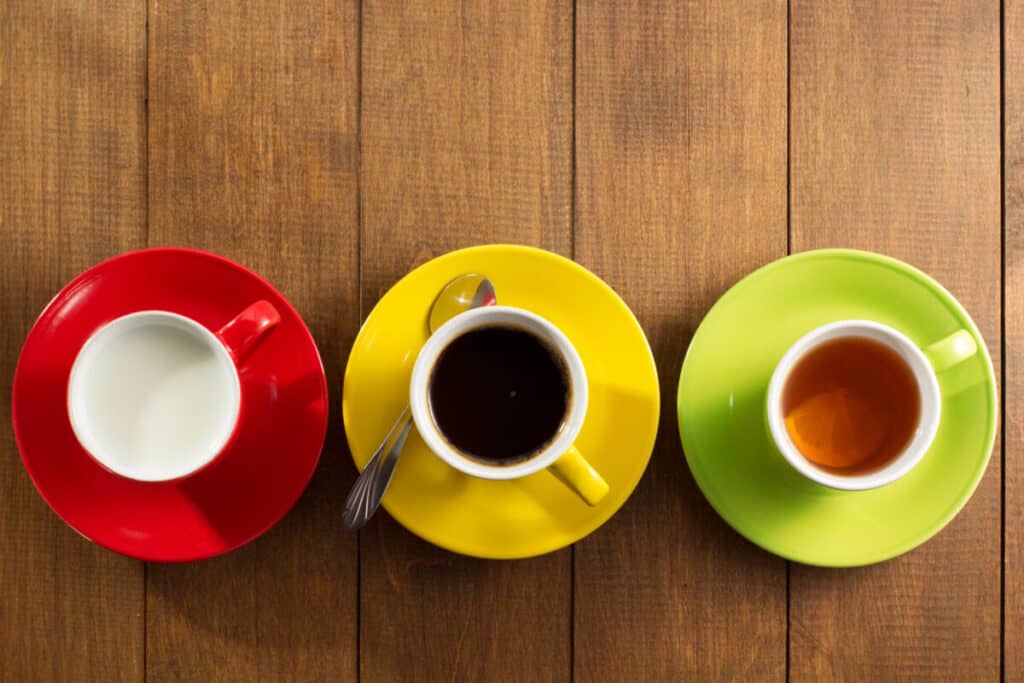
Caffeine in Other Beverages
In the past, most people consumed caffeine through coffee and tea specifically. However, there are now many alternatives to these drinks that can sometimes offer an individual more caffeine per serving. These caffeinated beverages include soda and energy drinks.
The soda with the highest amount of caffeine per 12oz is Mountain Dew. This soda contains 54mg per serving. This is less than the amount of caffeine in coffee but is more than the amount of caffeine in tea.
Other sodas range from 0mg of caffeine to 49mg of caffeine depending on the type of soda.
Most sodas have less caffeine than coffee but typically still have more caffeine than tea.
There are some sodas that are caffeine-free that are options for individuals who are interested in limiting the amount of caffeine they are consuming.
Many energy drinks have around the same amount of caffeine within them, but there is still a range from 75 to 300mg depending on the type of energy drink. The majority of these energy drinks contain more caffeine than any other type of caffeinated beverage. (Source)
What Time Should Caffeine Consumption Stop?
Caffeine’s effects on your body can linger for up to six hours after consumption. So, depending on how early you plan on unwinding and getting ready for bed would determine what time caffeine consumption should be stopped. Depending on your tolerance to caffeine, you may still experience some restlessness when trying to sleep even after hours have passed since the caffeine consumption. For most individuals, it is ideal to stop caffeine consumption roughly six hours before you intend to turn in for the evening.
It is important to try and learn how your body handles caffeine specifically. Some individuals can feel the lasting effects of caffeine for hours longer than most people, while others can barely feel any effects of caffeine at all. When consuming caffeine, it is important to know your limits and what time is best for you to cut off the caffeinated beverages. Starting with the recommended six hours before bedtime is probably the best place to start. If you had no trouble falling asleep, you could decrease that amount to five hours. But if you struggle to sleep after six hours of consuming caffeine, perhaps it is needed to increase the time between caffeine consumption and sleep to seven hours.
